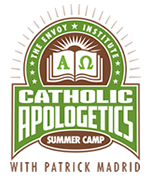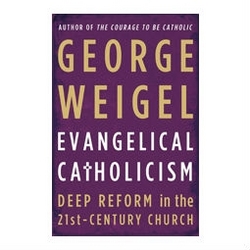 The 4th Annual Catholic Apologetics Camp is planned for the summer of 2013, August 8-14. The Envoy Institute under the direction of Patrick Madrid, is doing the programing.
The 4th Annual Catholic Apologetics Camp is planned for the summer of 2013, August 8-14. The Envoy Institute under the direction of Patrick Madrid, is doing the programing.Faith & Reason: February 2013 Archives
 The 4th Annual Catholic Apologetics Camp is planned for the summer of 2013, August 8-14. The Envoy Institute under the direction of Patrick Madrid, is doing the programing.
The 4th Annual Catholic Apologetics Camp is planned for the summer of 2013, August 8-14. The Envoy Institute under the direction of Patrick Madrid, is doing the programing.The Prefect of the Congregation for the Doctrine of the Faith, Archbishop Gerhard L. Müller, addressed the Pontifical Academy of Life on 22 February 2013. It was the annual meeting in Rome. Müller's talk didn't shatter too many windows by unearthing new problems, nor did it break new ground in the Church's teaching. Müller gives a brief assessment of the situation and that we have gone off the tracks in some ways. He does, however, shed light on the fact that we need to take more seriously our moral and faith formation and to put in the time doing the hard work to know the issues and how to respond to them according the parameters of the Catholic Faith. Too often we are afraid to do the hard work. And that's the ministry of the Prefect: to illumine and offer a corrective. Archbishop Müller did challenge, to a degree, the theological professorial establishment, even if the talk may be seen a bit anemic.
The full text: Gerhard Müller Human Life in Some Documents of the Magisterium.pdf
 In today's mail I received my copy of George Weigel's latest book, Evangelical Catholicism: Deep Reform in the 21-Century Church (Basic Books, 2013).
In today's mail I received my copy of George Weigel's latest book, Evangelical Catholicism: Deep Reform in the 21-Century Church (Basic Books, 2013)."The internal dynamics of he Church itself, attentive tot eh promptings of the divine Bridegroom and the unique challenges posed to the Great Commission by late modernity and post-modernity, have, together, impelled a new evolution in the Church's self-understanding and self-expression. The result of that evolution, Evangelical Catholicism, is an expression of the four enduring marks of Christian ecclesial life --unity, holiness, catholicity, and apostolicity."
Be sure to have enough sleep and at least have eaten one meal today before you read and give some serious consideration to what Father George Rutler, pastor of the Church of Our Saviour (NYC) has to say about the death penalty. A recent essay was published today in Crisis Magazine online.
MOST Catholics, the informed and untrained, have no idea what the Church teaches about the subject. Many will recall that Pope John Paul II taught in Evangelium vitae (1995) and that he frequently spoke against the death penalty and it was the subject of intervention when he would visit a country where the death penalty was utilized (think of his visit to Missouri). A papal encyclical doesn't change the teaching of the Church; it is however authoritative and it needs to be received. The matter of what level teaching an encyclical is, and to what degree it would bind conscience. For our purposes here, let's say that a papal encyclical is authoritative and it involves the virtue of prudence but that it doesn't contravene but it does nuance the teaching of the Church. Prudential judgment is just that, prudential. The Pope never changed the teaching of the Church. The blessed pope did try to reorient our thinking and the practice of killing legitimately convicted criminals. Remember, too, several years the heated debated between Cardinal Avery Dulles and Justice Scalia on the subject in First Things?
Father Rutler's article is helpful in giving us yet another understanding of how we might understand the death penalty. Do we actually accept Christian belief in the salvation of one's soul, that is, do we want to go to heaven? Read the article with openness, with a critical mind. As Saint Ignatius would teach, approach with the best of intentions to truly understand the other person. Knee jerk reactions are unacceptable for a Catholic who holds the integration of faith and reason. Father Rutler's argument is Catholic on all levels.
The article...
Capital punishment does not inspire roaring humor in healthy minds, so wit on the subject tends to be sardonic. Two of the most famous examples, of course, are: "In this country it is wise to kill an admiral from time to time to encourage the others," and "Depend upon it, sir, when a man knows he is to be hanged in a fortnight, it concentrates his mind wonderfully."
The first, "pour encourager les autres," is in "Candide" where Voltaire alludes to the death by firing squad of Admiral John Byng in 1757 for having let Mincorca fall to the French. The second was Samuel Johnson's response to the hanging of an Anglican clergyman and royal chaplain William Dodd for a loan scam. Byng's death was the last instance of shooting an officer for incompetence, while Dodd's was the last hanging at Tyburn for forgery. Dodd's unsuccessful appeal for clemency was ghostwritten by Dr. Johnson.

